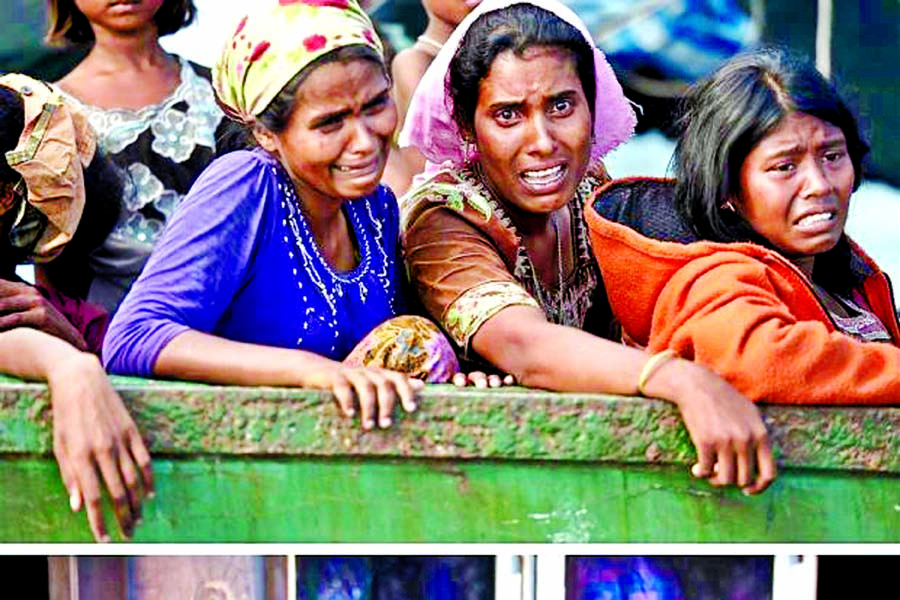
News Desk :
Collective initiatives and regional collaborations are needed to stop the violence against the ethnic minority group in Myanmar.
According to AFP since the crackdown that followed the killing of nine border guards on Oct 9, which the authorities have blamed on a Rohingya militant group, the relentless persecution of the ethnic minority living in northern Rakhine State, Myanmar, continues unabated.
Various international organisations and news agencies have reported systematic violence, including torture, mass rape, extrajudicial killings and evictions, committed by Myanmar soldiers against the Rohingya. At least 10,000 members of the Rohingya minority group have fled their homes since the military retaliation.
According to a United Nations refugee agency, the Myanmar military and border police are engaging in collective punishment of the Rohingya minority, yet the Myanmar government denies the allegations. The problem is the state of Rakhine is closed to the international media and aid agencies, preventing the verification of data and reports. The constant discrimination and current persecution have forced many Rohingya to flee from their homes to camps in Bangladesh. If the situation continues to deteriorate, the situation of mass forced migration of the Rohingya community may resemble the refugee crisis of a year ago, dubbed the Southeast Asian refugee crisis.
According to UN High Commissioner for Refugees (UNHCR) data, as many as 500,000 Rohingya are already internally displaced and since 2014 an estimated 94,000 asylum seekers have fled to neighbouring countries by means of deadly sea journeys. The commonly preferred destination is Malaysia, which hosts approximately 142,000 people. Indonesia currently has approximately 1,000 Rohingya refugees, excluding unregistered asylum seekers, mainly based in Aceh.
This means potential destinations, such as Malaysia, Indonesia and Thailand should be prepared to receive more Rohingya refugees and provide protection and necessary humanitarian assistance, especially to vulnerable groups like women and children.
As such, collective initiatives are needed now more than ever. Instead of spreading hoax pictures and inciting hatred against the Buddhist community in Myanmar, which will only make the situation worse and trigger a backlash against the Rohingya, we the people should act as conscious, responsible neighbours by supporting the numerous agencies providing humanitarian aid to the Rohingya, such as the Humanitarian Flotilla for Rohingya mission initiated by the Southeast Asia Humanitarian Committee (Seahum) and a network of NGOs in the region including PKPU and ACT in Indonesia and the Muslim Aid Malaysia, that send humanitarian and medical aid to conflict points and camps in Rakhine.
Non-adherence: Bangladesh is not upholding its commitment under the Bali Declaration as its Guard Bangladesh (BGB) personels guard its borders to prevent new Rohingya refugees from entering the country. – AFP Brace for a new wave: Myanmar’s neighbours Malaysia, Thailand and Indonesia should be prepared to provide protection and the necessary humanitarian assistance to Rohingya refugees, especially to their most vulnerable, the women and children. – Yet these short-term emergency responses should be followed by long-term solutions to address the roots of the problem more effectively. Current measures tend to be sporadic and impromptu. Last year, for example, the Indonesian government entered an-ad hoc agreement to allow a one-year transit for Rohingya refugees, who were supported by various NGOs, the local government, and the local community, with the expectation of a speedy resettlement in a host country. This was hampered by the lengthy bureaucratic process and low rate of refugee acceptance in destination countries such as Australia, New Zealand and the US.
The solution should thus be the implementation of stricter regional measures, including legal frameworks, at the Asean and Asia Pacific levels. The Bali Process, an international high-level forum on people smuggling, human trafficking and related transnational crimes cochaired by Indonesia, resulted in the Regional Cooperation Framework (RCF), which aims to push for more practical arrangements between its 45 member states, including the implementation of burden-sharing and collective-responsibility principles.
While the framework serves as a much-welcomed step forwards, it is non-binding and stipulates no consequences for non-adherence, as shown in the case of Bangladesh, which has failed to uphold its commitment made during the 2016 Bali Declaration. Unlike the European Union that has ratified applicable measures under the Dublin Convention, there is no existing legal framework in Asean to deal with refugees and forced migration. In the Southeast Asian region, only the Philippines, Cambodia and Timor Leste are signatories to the 1951 Refugee Convention. As the main political and economic regional grouping in South-East Asia, Asean seems to prefer to focus on its economic functions, while turning a blind eye to more pressing political and human rights issue like the Rohingya crisis.
This principle needs re-evaluating now that the Rohingya crisis has directly impacted Asean member states. Asean has to step up pressure on the Myanmar government to stop the persecution of and discrimination against the Rohingya people through persistent diplomacy. A stronger diplomacy is also needed to allow and ensure the admission of humanitarian aid agencies into the Rohingya area. Furthermore, a legal system to deal with the refugee issue in the region should be put into place. It is no longer sufficient or morally justifiable for Asean to cite its non-interference principle as a buffer to shirk its responsibilities.
– The Jakarta Post/Asia News Network

